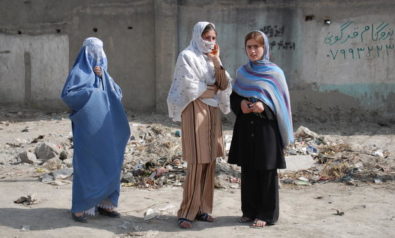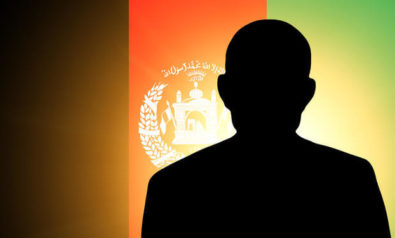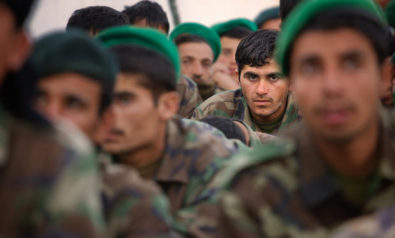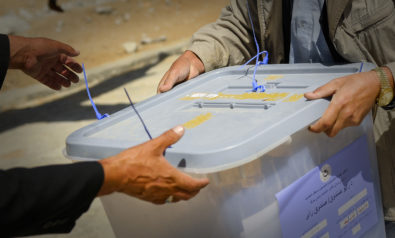Who will become Afghanistan's next president?
Background
Elections in Afghanistan are set to be held on April 5, 2014. Incumbent President Hamid Karzai is constitutionally barred from seeking a third term in office.
Several candidates are on the ballot — among the frontrunners being Abdullah Abdullah and Ashraf Ghani Ahmadzai. Abdullah, a presidential candidate in 2009 and former minister of Foreign Affairs, is head of the reform-minded National Coalition of Afghanistan. Ghani, the former Afghan finance minister, is running as an independent.
Other candidates include Zalmai Rassoul, Mohammad Daud Sultanzoy, Qutbuddin Hilal, Gul Agha Sherzai, Abdul Rabb Rasul Sayyaf, and Hedayat Amin Arsala.
If all goes (relatively) smoothly, Afghanistan will see the first democratic transfer of power in its history.
However, a runoff seems likely, meaning the winner of the election may not be resolved until late June. In addition, terrorism and fraud could ruin plans for a peaceful, free and fair election.
Why is the Afghanistan Presidential Election Relevant?
When American diplomat Richard Holbrooke died in 2010, he left behind much unfinished business in Afghanistan. Indeed, even a man of his genius could not seem to unravel the Gordian knot that is the region.
Karzai's mercurial personality, along with terrorism, warlords, drug trafficking, weapons proliferation and interference from neighboring countries, stymied Holbrooke's attempts to help Afghanistan on the path to stability.
The presidential election is a chance for Afghanistan to shore up confidence in its government. It will also give NATO and the US a chance to deal with a potentially more stable Afghan president.
Both Abdullah and Ghani are highly respected both in Afghanistan and among the international community. However, they are not perfect candidates.
Disturbingly, former Gen. Abdul Rashid Dostum is on the ticket as Ghani's vice-presidential candidate. While Dostum helped remove the Taliban from power, he is also known to have committed awful atrocities. His presence in the race is indicative of the long reach of warlordism in Afghan politics.
But a major question remains: Will Karzai keep to himself after the elections? The fraud that marred the 2011 campaign, as well as rampant nepotism under his watch, are signs that he probably intends to remain a loud voice in an already very crowded and tumultuous room.
The West, especially the US, in their exasperation at President Karzai's refusal to sign a security deal regarding troops in Afghanistan, will be glad to see someone else in power.
The international community has stressed the importance of free and fair elections in Afghanistan. Indeed, those closely following events in Afghanistan agree that a peaceful and smooth transfer of power will give the next government much-needed legitimacy.
However, several recent attacks may derail those hopes. On March 29, two suicide bombers attacked the Afghan election commission headquarters in Kabul. Earlier in March, the Taliban stormed the Serena Hotel in the capital city and killed nine civilians.
These attacks have led to fears that polling places located in Afghan schools and medical clinics will be targeted on election day. As the US and NATO withdraw forces, fears remain that the Afghan National Army will not be strong enough to withstand attacks from extremist groups.
Holding a free, fair and secure election, it seems, may take a miracle.
Image: Copyright © Shutterstock. All Rights Reserved
For more than 10 years, Fair Observer has been free, fair and independent. No billionaire owns us, no advertisers control us. We are a reader-supported nonprofit. Unlike many other publications, we keep our content free for readers regardless of where they live or whether they can afford to pay. We have no paywalls and no ads.
In the post-truth era of fake news, echo chambers and filter bubbles, we publish a plurality of perspectives from around the world. Anyone can publish with us, but everyone goes through a rigorous editorial process. So, you get fact-checked, well-reasoned content instead of noise.
We publish 2,500+ voices from 90+ countries. We also conduct education and training programs on subjects ranging from digital media and journalism to writing and critical thinking. This doesn’t come cheap. Servers, editors, trainers and web developers cost money.
Please consider supporting us on a regular basis as a recurring donor or a sustaining member.
Support Fair Observer
We rely on your support for our independence, diversity and quality.
Will you support FO’s journalism?
We rely on your support for our independence, diversity and quality.











